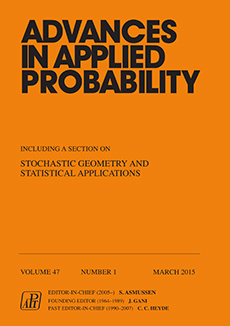Abstract
We consider the problem of reducing the response time of fork-join systems by maintaining the workload balanced among the processing stations. The general problem of modeling and finding an optimal policy that reduces imbalance is quite difficult. In order to circumvent this difficulty, the heavy traffic approach is taken, and the system dynamics are approximated by a reflected diffusion process. This way, the problem of finding an optimal balancing policy that reduces workload imbalance is set as a stochastic optimal control problem, for which numerical methods are available. Some numerical experiments are presented, where the control problem is solved numerically and applied to a simulation. The results indicate that the response time of the controlled system is reduced significantly using the devised control.
Citation
Saul C. Leite. Marcelo D. Fragoso. "Reducing response time in fork-join systems under heavy traffic via imbalance control." Adv. in Appl. Probab. 45 (4) 1137 - 1156, December 2013. https://doi.org/10.1239/aap/1386857861
Information





